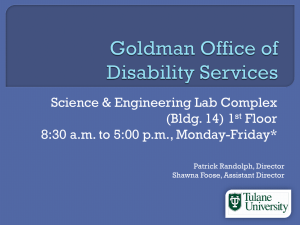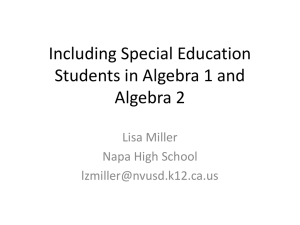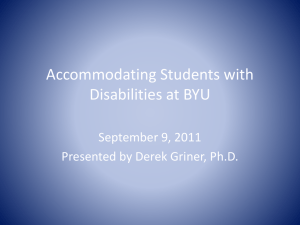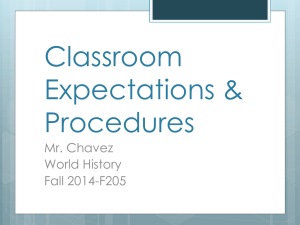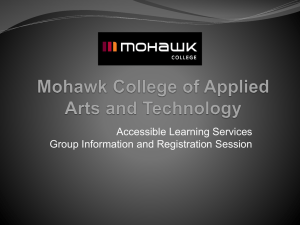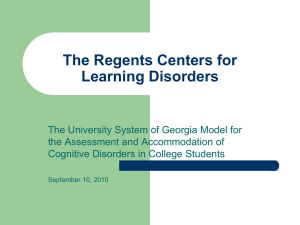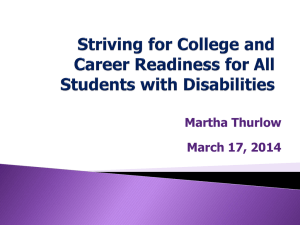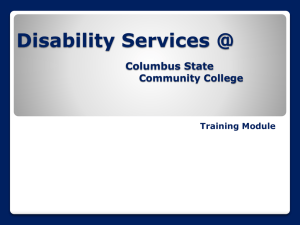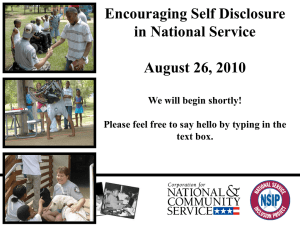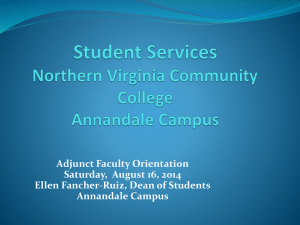Nine Strategies to Improve College Transition Planning for
advertisement
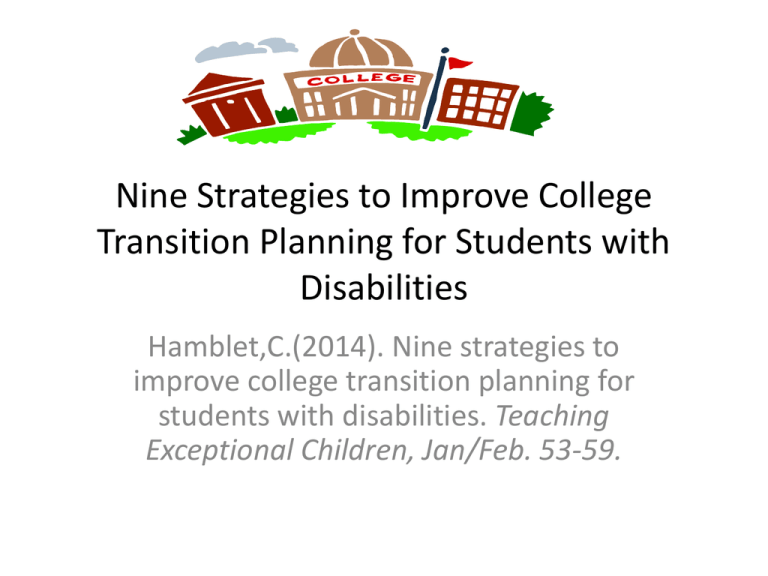
Nine Strategies to Improve College Transition Planning for Students with Disabilities Hamblet,C.(2014). Nine strategies to improve college transition planning for students with disabilities. Teaching Exceptional Children, Jan/Feb. 53-59. #1. Educate the High School IEP Team • Because colleges are allowed to reject accommodations that change the fundamental curriculum of the course, HS IEP teams need to be educated on what is considered reasonable and unreasonable by college standards. Accommodations #1 Continued 1. Students and staff should take a field trip or field trips to local colleges to determine what is considered reasonable. 2. During this trip, the staff, faculty, and students can learn from the Disability Services’ staff the procedure for applying for services like accommodations. 3. The Disability Services staff can discuss which accommodations are generally granted and which are not. #1 Continued 4. The Disability Services staff can introduce the student to the technology that is available to help. 5. The Disability Services staff can show the student the testing rooms available if testing accommodations are important to the student. 6. Although not all colleges are the same, this should help the HS staff have an idea of what is reasonable and what is not reasonable. #2. Reach Out to Families 1. Not all families are familiar with Disability Services in College. Some are misinformed about the services. All families deserved to be completely and accurately informed. 2. Disability Services are completely free to students who truly qualify for them. To The Parents of #2 Continued • IMPORTANT 3. Colleges do not alter admissions for students with disabilities so if a student with a disability wants to go to college he or she must take the same classes as his or her non-disabled peers. 4. Limit the accommodations for students heading to college because they cannot all be used in college. Set the student up for success not failure! #2 Continued 5. Students must self-identify. They must apply for these allowable accommodations. In high school, it was up to the school to provide them. In college it is up to the student to go after them. 6. The eighth grade meeting is a perfect time for this information to be disseminated for the first time. Then, have transition night each year. Also, give this information out at every IEP meeting. 7. Educating students and their parents about post secondary education is extremely important to transition. Information can be disseminated through email periodically as it applies. Websites www.heath.gwu.edu www.stateart.com/works.php?workId=47&i=2 Texas Education Agency #3 Encourage Students’ Future Independence 1. Consider offering more support to a college bound freshman as he or she adjusts to HS then reducing the number of supports as the student gets older. Consider eliminating all the accommodations and modifications that will not be allowed in college. 2. Before removing any accommodations or modifications, teach the student coping strategies. (See the next slide for suggestions) Common Accommodations and Coping Strategies High School Coping Strategy Study Guide Provided by Teacher No penalty for spelling errors. Train students to create their own study Guides No penalty for spelling errors Teach student to use a hand held spellcheck device on tests and a word processor with spell check on homework Faculty member explains test questions Reduce assignment length Provide instruction in test taking strategies such as underlining key words and rephrasing confusing questions as statements Improve student’s writing skills so they meet expectations Extra time to complete assignments Teach student time management skills with planners, breaking assignments into chunks, and setting interim deadlines. Faculty member reminds student to stay on task Encourage student to take a front seat and use tools to focus #4 Teach Students to Use Assistive Technology • Colleges have no obligation to provide personal services to students. They have to be ready to function independently in regard to their academic tasks. • Colleges do generally offer the use of technology devices for support. #4 Continued • As part of research what supports are available for students with disabilities, high school personnel can discover what types of assistive technology devices are typically available and ensure that the student is able to use those devices. • The districts technology staff should work together with instructional staff to identify appropriate products for the particular student. • Free demonstrations may be available. • The state may have a technology matching program. • A product demonstration would benefit the student and the family greatly. Technology Tools for Students with Disabilities Area of Disability High School Accommodation Technology Solution Reading Teacher or parent reads text aloud; reduction in reading assignment Text-to speech software (e.g. Wynn, Kurzweil, Write Gold, online or built-in screen readers) Composing Papers Teacher or parent serves as scribe as student dictates, assists in organizing ideas Speech –to text software (e.g. Dragon NaturallySpeaking) graphic organizer software (e.g. Inspiration) Note Taking Teacher or aide provides notes Digital recording devices (e.g. Smartpen ) for lectures, electronic templates to organize notes Exam Preparation Teacher or aide creates study guides Sites or applications students can use to create their own flash cards (e.g., http:/www.gflashcards.com,quizlet .com) #5 Give Students the Documentation They Need 1. Many colleges will not consider giving accommodations on testing that is over 3 years old. 2. For college bound students, it is best that they be tested during their high school years. The later in their high school career, the better. 3. Optimally students should be given a complete cognitive and achievement test report in standard scores and percentiles. Colleges do not look at grade equivalents. Many colleges require their students to have been tested with adult tests. #5 Continued • IMPORTANT – Students and parents of students with ADHD or with a specific learning disability (LD) need to understand that some schools require little to no documentation while others want a neuropsychological evaluation. – Public schools are unlikely to provide this because it is generally not necessary for a Free Appropriate Public Education (FAPE). – Parents-should be advised not to seek private testing until their child has decided where to attend school. #5 Continued Summary Of Performance • High Schools should generate a list of colleges that provide testing at a reduced costs. • If the testing cannot be completed (either by a private source or the college) the institution can allow accommodations on a temporary basis until the testing is complete. • If district policy does not allow for testing students in HS, the staff should make the Summary of Performance as detailed as possible. • (Teague ISD does not have that policy.) #5 Continued • Summary of Performance A model of the Summary of Performance Document was created in 2005 And was endorsed by the Learning Disabilities Association of America http://www.Ianatl.org/aboutld/adults/post_secondary/sop.asp Even if districts do not use the template, the documents indicates what type of information should be included. #5 Continued • The SOP should include: • A historical overview of the student’s need for and use of accommodations including: – Why the student was in need of special education – How the disability substantially limits learning – What services and accommodations the student has received over the years and how they have helped the student compensate for the disability #5 Final Because college personnel are not as familiar as public school personnel in working with students with disabilities, the Summary of Performance helps the staff understand the student’s particular weakness and how the accommodations helped the student in lieu of recent psychological testing. #6 Educate Students about Their Disabilities and Strengths 1. Students have to ask/apply for accommodations in college-so they must understand their disability(ies)and their strengths to know exactly what they need to request. 2. Asking for too many accommodations or the wrong accommodations can be just as detrimental to the students GPA as asking for no accommodations at all. #6 Continued 3. Students may be better equipped to ask for accommodations once they have started college and can see what types of assignments are difficult for them. 4. The Disabilities Services office may have Learning Styles Inventories a student can take to assist with task. #6 Continue Public Schools can help students be more prepared by letting them lead their IEP meetings rather than being passive participants. The student may be uncomfortable at first but it is a very beneficial experience for the student. Information About Students Led IEP Meetings • http://www.setp.net/articles/article1005-1.html • http://files.eric.ed.gov/fulltext/EJ967458.pdf • http://www.ciclt.net/ul/mgresa/2.HowtoHelpStudentsLeadIE P.pdf • http://www.vermiliontpc.com/articles/Studentled%20IEP%20by%20McGahee.pdf http://www.vermiliontpc.com/articles/Studentled%20IEP%20by%20McGahee.pdf • http://www.nsttac.org/sites/default/files/assets/pdf/NSTTAC-DCDT_Fact_Sheets/StudentInvolvementIinTheIEPProcess.pdf #7 Explicitly Teach Learning and Organizational Strategies • Specifically-Students with ADHD and LDs struggle with the academic rigor at college; however, given the appropriate accommodations for note taking, test preparation, time management, written expression, reading, and assignment tracking they have the potential of being successful. #7 Continued Teaching students strategies for success should be done using direct instruction just like any other task. Assistance for strategies can be found at: The Learning Tool Box: http://coejmu.edu/Learningtoolbox/s2top.html Sweet Briar’s Academic Resource Center http://www.arc.sbc.edu/index.html #8 Ensure that Students are Prepared to Apply for Accommodations in College 1. Students must know how to apply for accommodations 2. Students must understand their disability. 3. Students must be prepared to self-advocate. 4. Students should develop a list of helpful accommodations. 5. Students should meet with their case manager or counselor to ensure full understanding of how their diagnosis was made. #8 Continued 6. Students must understand how and why their diagnosis was made. 7. Students need to know how their disability(ies) impact learning. For example: “Because I have an oral expression disorder, it is hard for me to answer questions in class..” 8. With the desired list of accommodations, the students should be able to explain why they are beneficial. #8 Final 9. Having a single handout from each college the student is interested in outlining the process will assist the student. 10. Colleges must provide basic accommodations free of charge. 11. If the student requires frequent assistance from the Disabilities Center, it may require a fee service. These are not widely available but can be found through guides such as: These colleges should be emphasized. The K&W Guide to College Programs & Services for Students with Learning Disabilities or Attention Deficit/Hyperactivity Disorder and Colleges for Students with Learning Disabilities or AD/HD. #9 Create a Districtwide Transition Program 1. Student success in college does not just happen for any student. All students have to learn study habits and college readiness skills. 2. Students with disabilities have to learn more. Districts cannot just hope a student with a disability will be ready. A coordinate set of activities must be in place to ensure success. 3. A good transition program must be in place. #9 Continued 4. These coordinated activities must be planned for each student so the district is sure each step will get completed in a timely manner. 5. Staff should be designated to be responsible for each step. 6. Implementing a cohesive, comprehensive transition program is the only way the district can ensure that all of these steps will be done for our college bound Lions with Disabilities. Contact Information • • • • • • Catherine Schmidt, M.Ed. Teague ISD Director of Special Education/504/Principal cschmidt@teagueisd.org 254-739-1440 Teague ISD-Where Great Things Happen for Kids Every Day
